Topic-JUSTICE: WHAT’S THE RIGHT THING TO DO? (VIDEO ANALYSIS) Submitted By- Anshika Manchanda CLASS- 4BBA LLB Reg. no.- 22212211 Submitted to- Dr.VIJAISHREE DUBEY PANDEY

explanation of some of the most debatable moral issues and justness. The method Sandel chooses in episode one, ‘The Moral Side of Murder,’ is to engage in a Socrates-like discussion with the viewers in the style of the Socratic method. The Trolley Problem THE TROLLEY PROBLEM The classic trolley problem is about sacrificing one life for five. The moral question of whether or not to divert the trolley car onto another track to save five guys working there in the 1st scenario is juxtaposed with the reluctance to push a fat man off a bridge in the 2nd scenario. It shows that moral reasoning is complex and making decisions in ethical situations is difficult. In the classic ethical dilemma “the trolley problem,” one is faced with a situation where a trolley car is speeding towards five workers on its main track, and you as driver have only two choices; either you let it continue on its trajectory which will kill all those trapped along its path or turn it onto another side track where it will hit only one worker who will definitely die? If any individual were asked this question, most would choose switching the trolley to another track due to their belief that killing one person would be morally preferable than allowing other five people die. These principles are in line with utilitarianism, which gives priority to increasing the general happiness of people or decreasing the overall suffering. Moreover, many argue that opting to save more lives is morally right than not doing anything which will lead to more deaths. Some relate it to real-life situations like heroic actions by emergency respondents during incidences such as 9/11 where those involved had to make choices on life and death in order for them to save as many as possible. This doesn’t mean that there isn’t a better reason for stopping the trolley though because people believe that it’s morally right to minimize harm and maximize utility hence these difficult choices including sacrificing one individual for the benefit of others being justified. ✦The dilemma of sacrificing one life to save five lives • In the first scenario, the majority agreed to kill one person to save five in a tragic circumstance. • In the second scenario, as an onlooker, the majority wouldn't push a fat man off a bridge to save the five workers. ✦The moral dilemma of making difficult choices in ethical situations • In the first scenario, the question is whether to push a fat man off a bridge to stop a runaway trolley from killing multiple people. • In the second scenario, a doctor must choose between saving one severely injured patient or saving five moderately injured patients. • In the third scenario, a transplant surgeon must decide which of the five patients in need of a transplant should receive an organ.
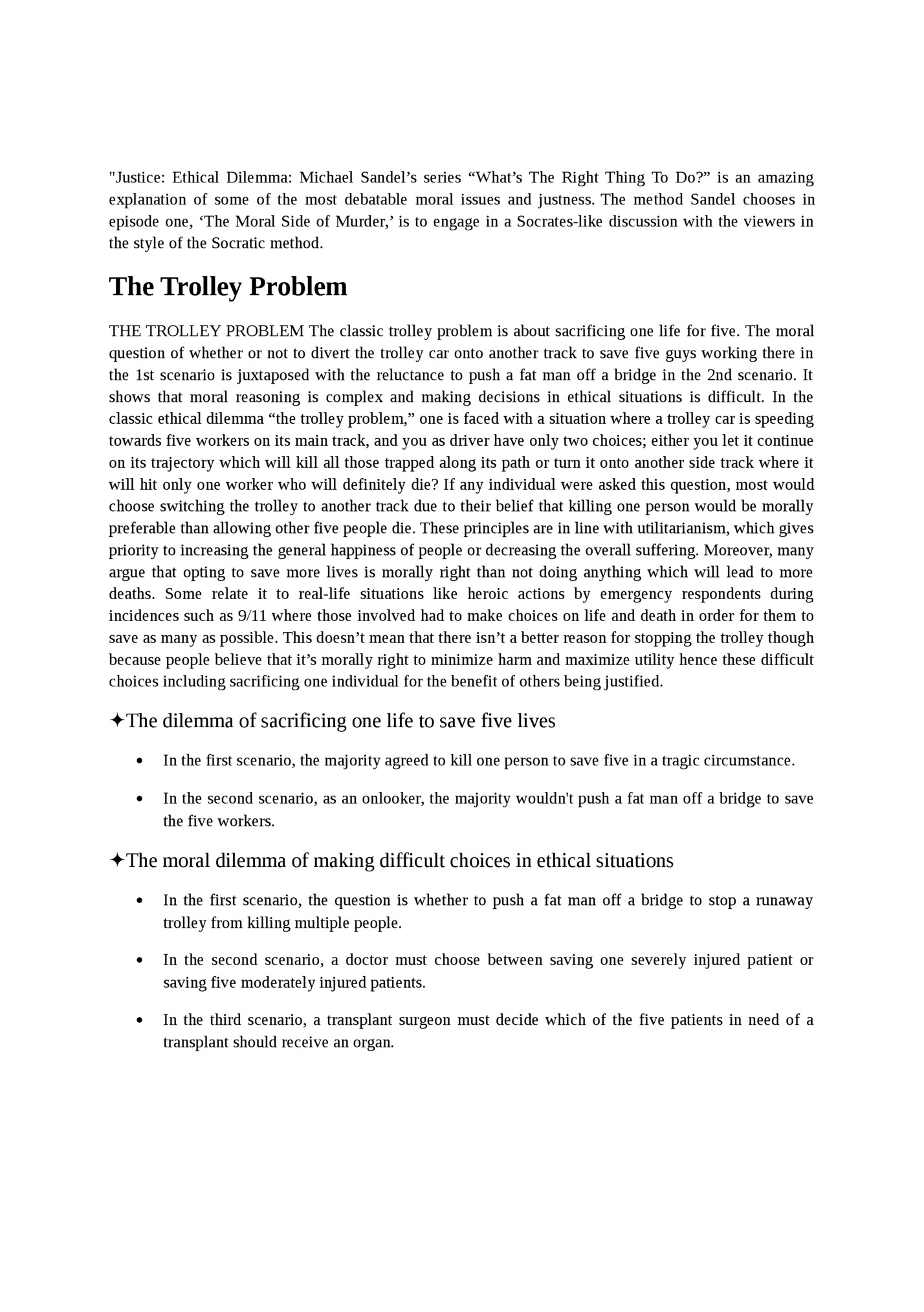
The video explores the difficult ethical issues about organ transplantation by presenting scenarios where hard choices have to be made such as taking organs from one healthy person to save several lives. It brings out moral values based on consequentialism and urges people to think ethically in making decisions. A new level of complexity arises in the ethical debate surrounding the trolley problem extension involving organ donation as it introduces the possibility of using a healthy individual’s organs. One proposition suggests extracting all five organs from the healthy person to save the five workers on the main track, while another proposes using the healthy person's organs to save four of the workers, resulting in one fatality. These scenarios prompt an exploration of moral principles, particularly consequentialist reasoning, where the consequences of actions dictate their moral value. On the other hand, individuals who support the removal of all the five organs may point out that this is in line with utilitarianism because it saves many people’s lives. Or else, supporters of using healthy person’s organ to save lives for four workers might accentuate equitable and independent principles arguing that sacrificing one life for others without consent is morally unfair. The discussion explores the intricacies involved in weighing conflicting moral concerns which underscore the difficulty of making ethical decisions in morally ambiguous circumstances. ✦The Impact of Philosophical Books The video delves into the impact of philosophical literature on personal and political risks. It suggests that reading philosophical books can lead to personal growth and a deeper sense of responsibility as a citizen. However, it also highlights the potential consequences of engaging in political philosophy, emphasizing the risks associated with challenging established beliefs and conventions. The video centers around specific factual elements that are pivotal to its narrative and are as follows-: • Reading philosophical books can unsettle us and confront us with what we already know • Philosophical books estrange us from the familiar and invite us to see things in a new way • The familiar becomes strange, and self-knowledge can never be unthought • Moral and political philosophy is a story that revolves around us, carrying both personal and political risks • Reading these books can lead to becoming a better, more responsible citizen ✦Public policy and political philosophy may not always make you a better citizen The issue of political philosophy, to some extent, may lend itself to a state of being detached and cannot even catalyze individuals to practically engage in municipal or national affairs. This human endeavor, so as any other scientific field, at its core contradicts fixed paradigms, archetypes, and long-accepted notions, in an effort to break them that might be by definition advocated uneasy or upsetting. In this case, political philosophers might even face personal and political repercussions as they base their decisions
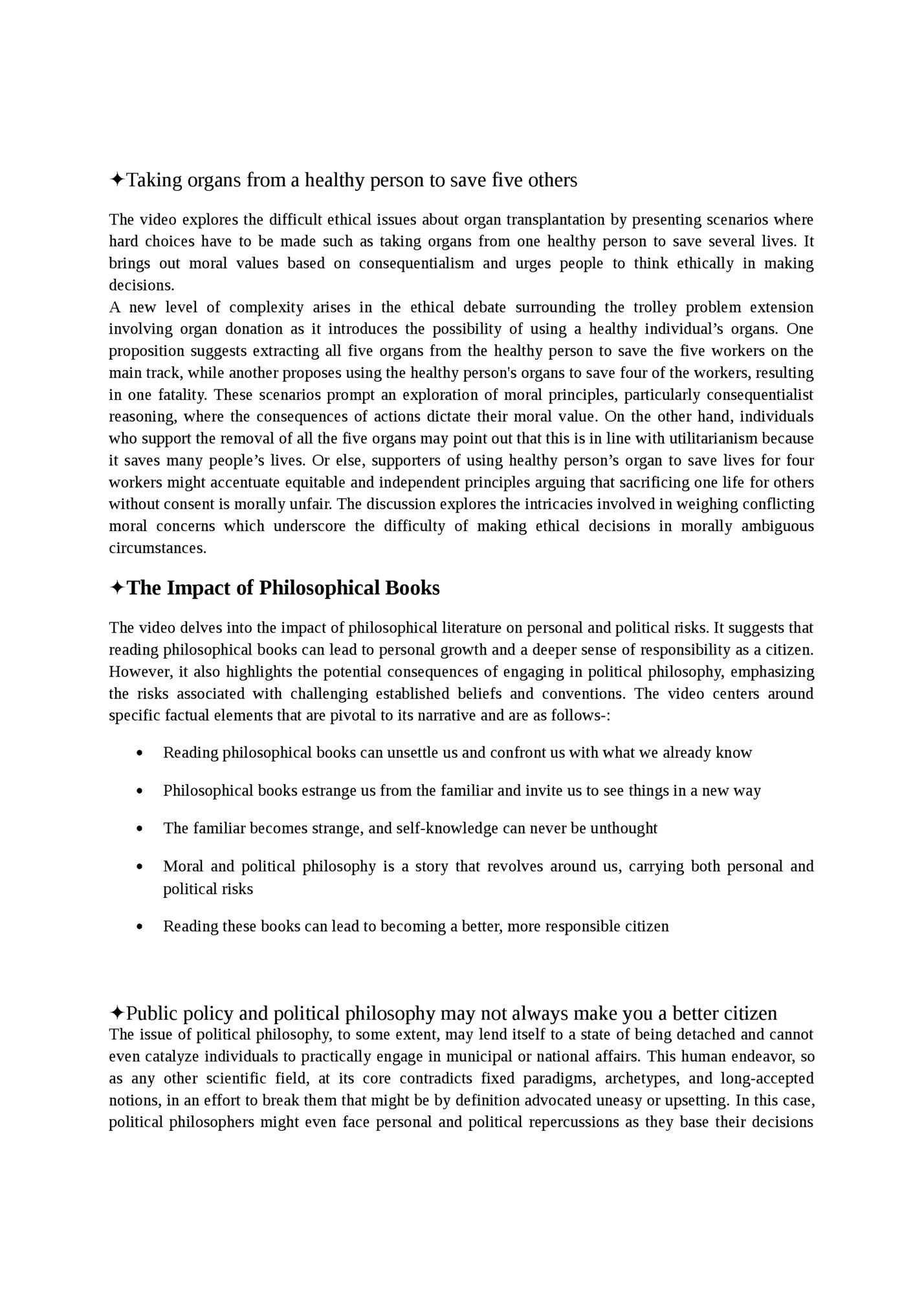
intellectual exploration can foster a sense of skepticism, serving as a coping mechanism to navigate the uncertainty and unresolved ethical dilemmas that arise from grappling with complex political and moral questions. ✦Organ transplantation and moral arguments In the discussions, it was observed the manner in which the arguments were conducted and the underlying principles guiding the judgments of particular cases. It became evident that moral reasoning often shifted between considerations of consequences and the inherent nature of actions and juxtaposed consequentialist moral frameworks with categorical ones, discerning their distinct approaches to ethical decision-making.The main objective, in the framework of the exploration, is to examine utilitarianism as the most important form of consequentialist moral theory, which was formulated by Jeremy Bentham, to provide the fundamentals in understanding the practices and rationale behind this theory. Utilitarianism and Moral Reasoning Harvard University examines utilitarianism as a version of consequentialist moral theory, proposed by Jeremy Bentham, aiming to maximize utility. Bentham's utilitarianism is summarized by the slogan 'the greatest good for the greatest number • In fact, there are very few actual cases that I can speak to specifically at this time. Dudley and Stephens' serve as the real-life example of the theory of maximization of utility, highlighting the "scarcity vs. survival" paradigm and raising considerations about obligation and guilt. Bentham defined utility as the notion that the greatest pleasures minus pains and the biggest happiness minus suffering should weigh more than the smallest pain minus pleasures and the little pains minus pleasures. The principle of maximized utilitarianism regulates both individual decisions and societal laws. The fact that Bentham's utilitarianism policy is summed up as, "the greatest good for the greatest number" and the Queen vs. Dudley and Stephens case proves that these ideas were not just theory, but they were completely applicable to real life. The case of the three shipmates, Dudley, Brooks, and Stephens, who ended up using the cabin boy to survive while stuck in the ocean, is an ethical question that makes one to contemplate between right and wrong. The misdeeds no doubt are inexcusable although the underlying problem of their circumstances relates the inquiries about the moral and legal responsibility of their actions. There are those who see dire skirmishes in which the very chances of survival are at stake as the scenarios which at any moment plead for one's survival to be accorded priority even if one has to resort to a way that is viewed by the society as an offense. The gap between the ethical or the moral dimension of what is being done and the legality of the action stands out and highlights how complex is morality in extreme situations. Pragmatists of this movement claim that not only the degree of need, but also the fulfilment of the need, may impact the outcome of guilt. It is because a person may take drastic measures to survive in such extreme situation, but conditions still might not seem settled. As far as the prosecution is concerned, customary values are what sets the limits for the nature of rights and the actions that are consistent with them; irrespective of
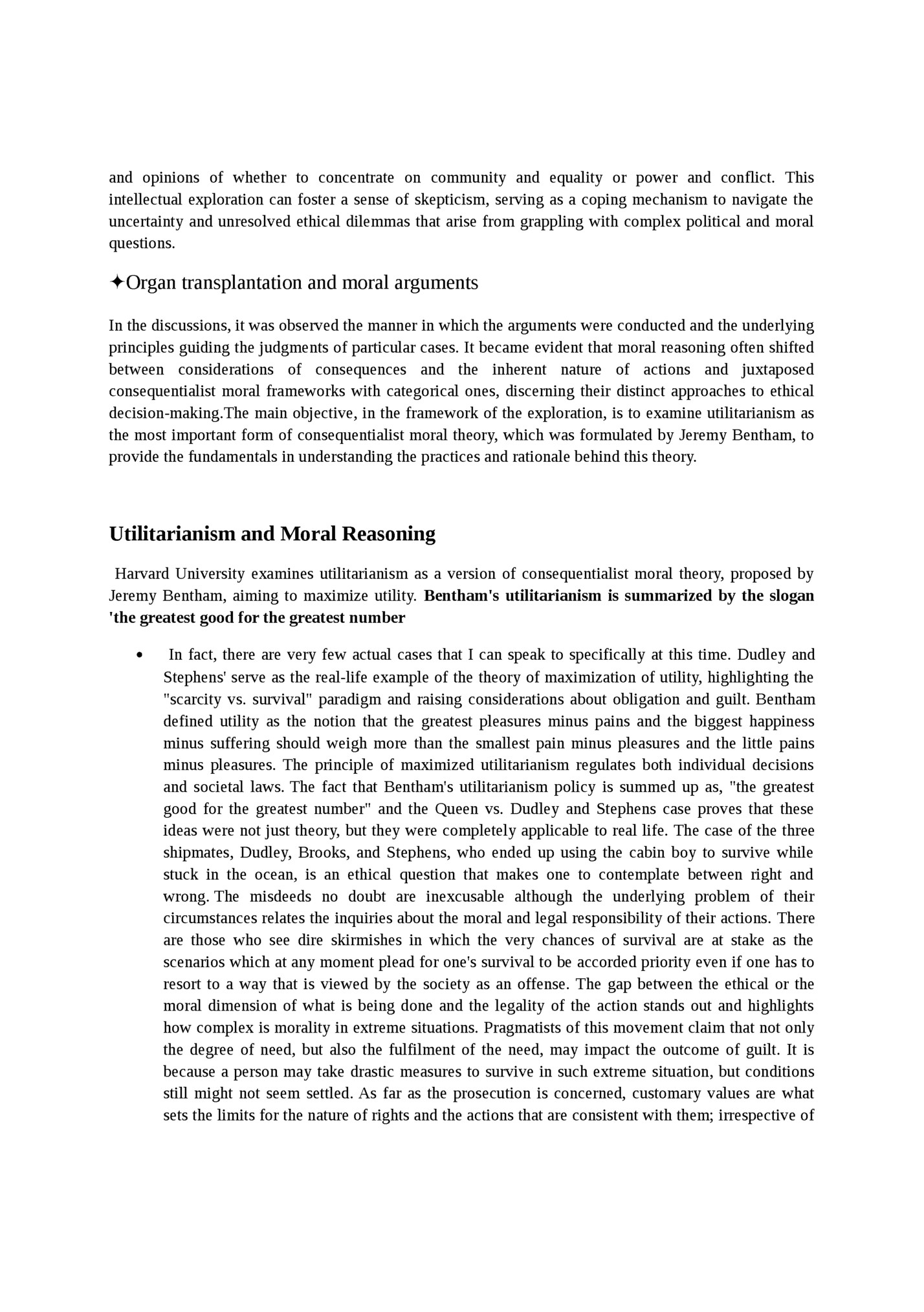
turns on the intricate tension between the breakdown of normal morality and the effort to punish excesses consistent with survival. Consent, Cannibalism, and Moral Permissibility The video investigates the complexities of moral reasoning in cases of consent, cannibalism, and moral justification. It delves into the ethical implications of cannibalism, highlighting the role of personal morals in determining one's opinion and the significance of consent in making moral judgments. Consent does not morally justify killing. Even with consent, it would not be morally justified. People who think consent justifies killing should know that the importance of consent is making a moral difference. Cannibalism is morally objectionable. Eating a human is morally incorrect. Even in the scenario of waiting until someone died, cannibalism is objectionable. Personal morals play a role in determining one's opinion and Consent does not make cannibalism morally acceptable. The lottery idea does not change the moral permissibility of cannibalism. The main moral issue is the lack of consulting the cabin boy, causing him to have no idea what was going on. Only about 20% think it's morally permissible, led by Marcus. Some argue that the real problem is the lack of consent, whether to a lottery or Kathleen's idea. Adding consent makes more people consider the sacrifice morally justified. Even with consent, a lottery, and a final murmur of consent, some still believe it would be wrong. The categorical moral reasoning suggests that even with a lottery, it would still be wrong due to coercion and lack of remorse. The Moral Dimensions of Murder The moral and philosophical dimensions of murder are explored, challenging societal norms and emphasizing the importance of considering the welfare and happiness of all involved. The video prompts viewers to question the arbitrary nature of criminalizing certain activities and to consider the complexities of moral reasoning in the context of justice and moral philosophy. ✦Murder is murder, regardless of circumstances Murder is viewed by society as wrong in all situations. Consider the well-being and pleasure of everyone concerned. People commit crimes to help their family. Criminalizing specific activities is arbitrary. The act and mentality of murder exist regardless of the stakes. Bentham's principle of prioritizing the larger good is applicable. The agreement to follow a fair procedure validates the outcome. The question of why specific techniques justify the outcome needs to be investigated. The moral work of consent and its relevance will be discussed. Conclusion: Through this video, an in-depth exploration of the ethical and moral dilemmas is presented, consequently leading to questioning of the underlying theory and effects of the principles of philosophy on real-life situations. The world being so unfair that it makes you question your deep belief of what is right and wrong, also the justice that does apply in the world.
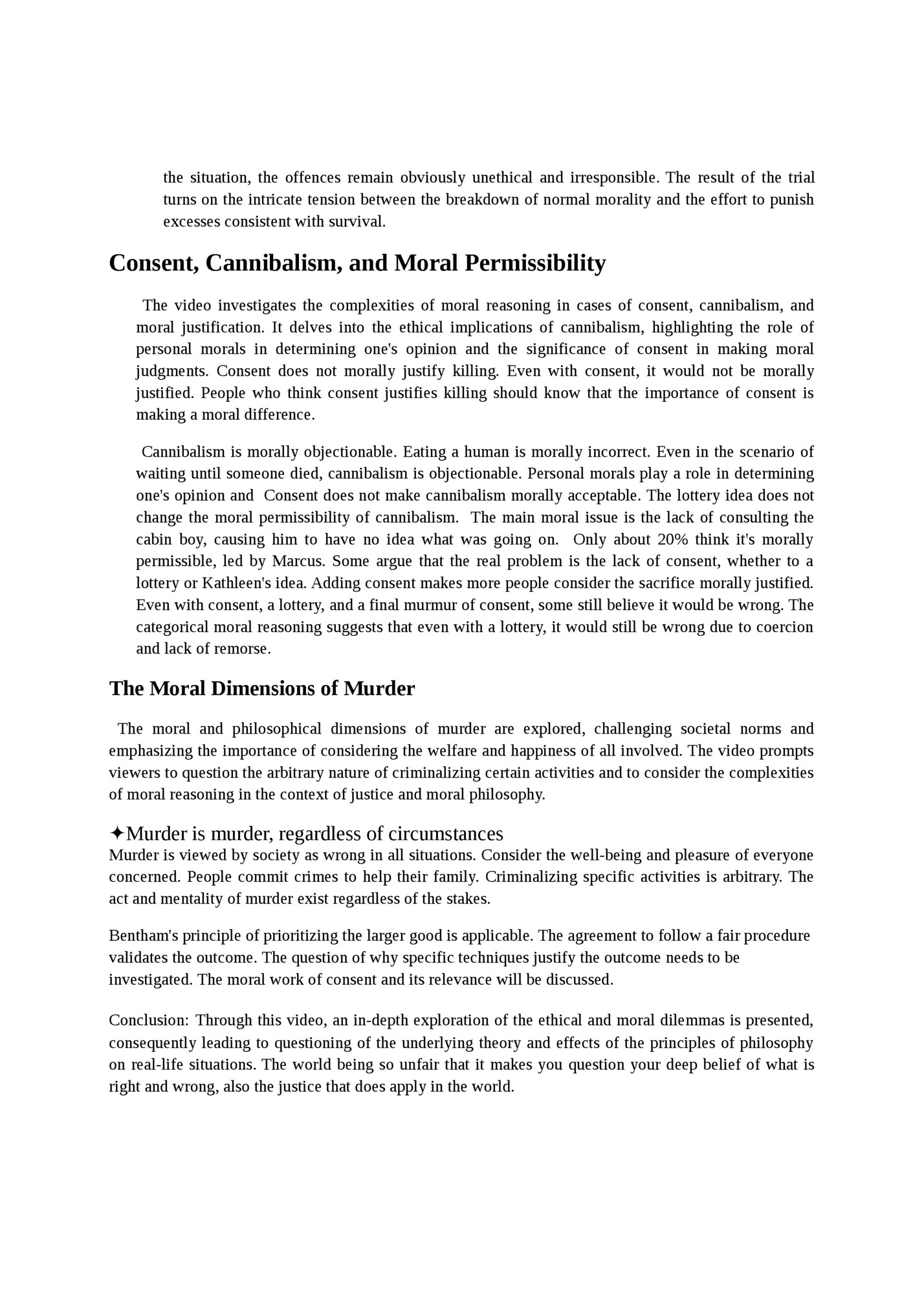
PRICE TAG ON LIFE" This video delves into the conundrum of justice and utilitarianism through a lively discussion on placing a price on life. Maximizing Utility: The Utilitarian Philosophy Utilitarianism aims to maximize general welfare, emphasizing the balance of pleasure over pain as the primary principle for individuals, communities, and legislators. This philosophy is employed for costbenefit analysis by companies and governments, exemplified in the implementation of smoking tax in the Czech Republic. ✦Utilitarian philosophy of maximizing general welfare • Bentham's version of utilitarianism focuses on maximizing the balance of pleasure over pain • Maximizing utility is the primary principle for individuals, communities, and legislators. • Cost-benefit analysis places value on costs and benefits of proposals. • Utilitarian logic is used for cost-benefit analysis by companies and governments • Example of cost-benefit analysis with smoking tax in the Czech Republic Valuation of Humanness: The Debate This issue that is hardly ever enough to capture the importance of human life in the practical function makes it challenging to comprehend whether to apply the monetary figure for the decision-making purposes. Despite the moral dilemmas, cost-benefit analysis remains essential for businesses to thrive and people to meet their daily needs, raising questions about compromising individual rights for collective utility. The episode revolves around certain facts-: • Debate around the inclusion of emotional and non-monetary factors in cost-benefit analysis • Contrasting views on whether a numeric value should be assigned to human life for decision making • Debate around the inclusion of emotional and non-monetary factors in cost-benefit analysis • Contrasting views on whether a numeric value should be assigned to human life for decision making • Cost-benefit analysis is essential for businesses to be profitable and for people to use their cars for daily needs. • Without cost-benefit analysis, businesses would struggle and people would be unable to use their cars for essential tasks.
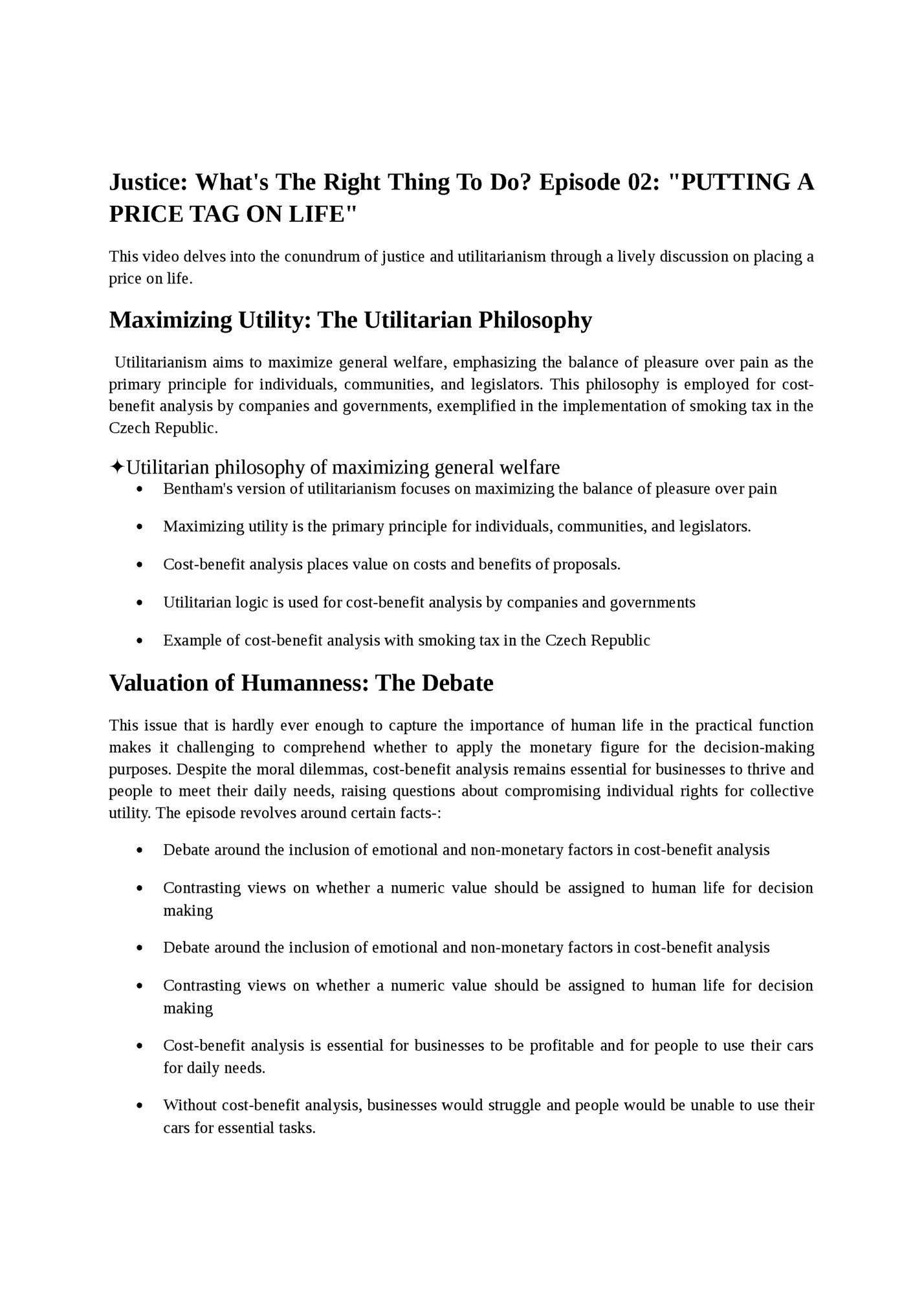
Even though there are debates about putting a monetary value on human life, sacrificing some lives may be necessary for overall satisfaction. • Utilitarianism may compromise individual rights for collective utility • The boy who was eaten in the shipwreck scenario still had the same right to live as the others, despite being the minority with less chance of survival. • The excruciating pain of a few Christians in ancient Rome, when weighed against the collective ecstasy of Romans, could potentially be considered outweighed according to utilitarian calculus, which is problematic. Translating Values to Money: The Torture Dilemma • The ethical implications of translating all values into a single measure are magnified in the debate on torturing a suspected terrorist for crucial information. This challenging scenario prompts us to question the possibility and consequences of quantifying ethical considerations, distinguishing between higher and lower pleasures, as proposed by John Stuart Mill. In debating the ethics of torturing a suspected terrorist for crucial information, one must carefully consider the moral duty to respect individual rights and the broader implications of torture on a societal level. This ethical dilemma raises questions about the possibility of translating all values into a single uniform measure of value and the challenges inherent in quantitative analysis. Despite attempts to reform practices, such as adopting compromises like a payment of fifty pence to defray costs for overnight male guests at a college, fundamental questions persist regarding the assumption that all moral considerations can be reduced to monetary terms. It is imperative to recognize and distinguish between higher and lower pleasures, challenging the notion that everything can be measured solely in economic terms. John Stuart Mill sought to humanize utilitarianism and address humanitarian concerns, aiming to accommodate such concerns and respect individual rights within the utilitarian framework. His seminal works, 'On Liberty' and 'Utilitarianism,' underscore the importance of defending both individual and minority rights. Mill further argued that utilitarians can distinguish between higher and lower pleasures based on people's actual preferences, offering a nuanced perspective within the utilitarian framework. Cultural Experiences and Higher Pleasures The debate over how to evaluate cultural experiences, whether based on pleasure or abstract ideals, highlights the distinction between higher and intense pleasures. This deliberation leads us to contemplate the intrinsic value of cultural experiences and their impact on individual well-being, posing a significant challenge in applying utilitarian philosophy. • Debating whether cultural experiences should be judged based on pleasure or abstract ideals • Contrasting enjoyment of modern media like The Simpsons with appreciation of classic works like Shakespeare and Rembrandt
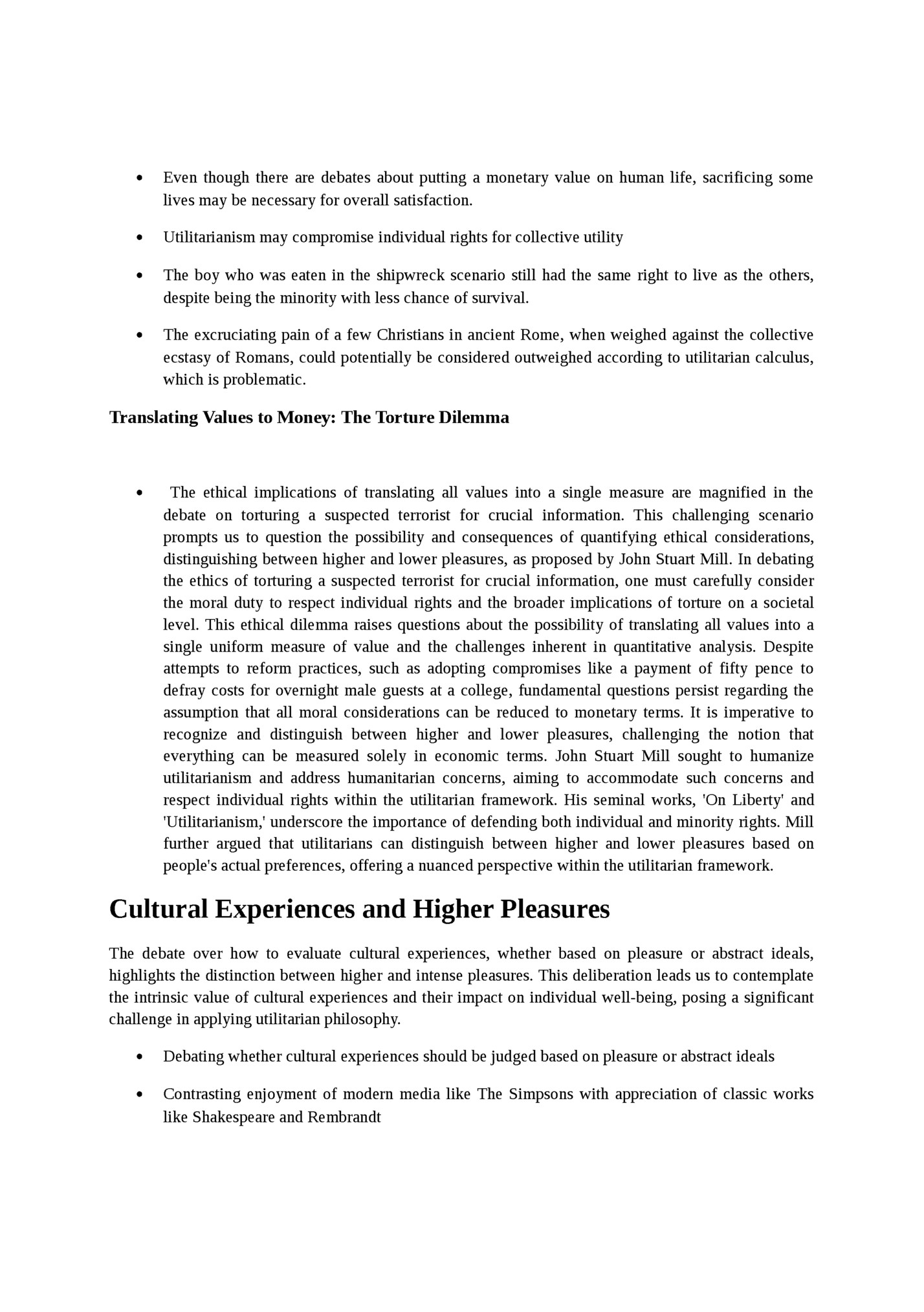
Choosing between higher pleasure and intense pleasure • People may prefer higher pleasures over intense pleasures in the long run • A rat chose intense pleasure over survival, but humans may value higher pleasures more over a lifetime The Sanctity of Justice and Non-Utilitarian Perspectives • The sacred and privileged nature of justice, rooted in utility, presents a compelling argument for the collective higher social utility and paramount obligation of justice. Yet, it is crucial to explore non-utilitarian ways of accounting for rights and justice, acknowledging the legacy of Jeremy Bentham and the enduring influence of his utilitarian philosophy in moral and legal discourse. • Justice is sacred and privileged, grounded on utility. • Mill argues that justice should be regarded collectively as having higher social utility and paramount obligation. • He believes that respecting individual rights and doing justice will benefit society in the long run due to utilitarian reasons. • Exploring non-utilitarian ways of accounting for rights and justice. • The legacy of Jeremy Bentham and his utilitarianism philosophy in moral and legal philosophy. • The preservation of Bentham's body to serve as a study of anatomy and to inspire future generations of thinkers Conclusion: As we navigate the intricate intersection of justice, rights, and utilitarianism, it becomes evident that the quest for the right thing to do is multifaceted and laden with ethical quandaries. The balance between individual rights and collective welfare, the challenge of quantifying values, and the enduring legacy of utilitarianism continue to shape our notions of justice and morality.
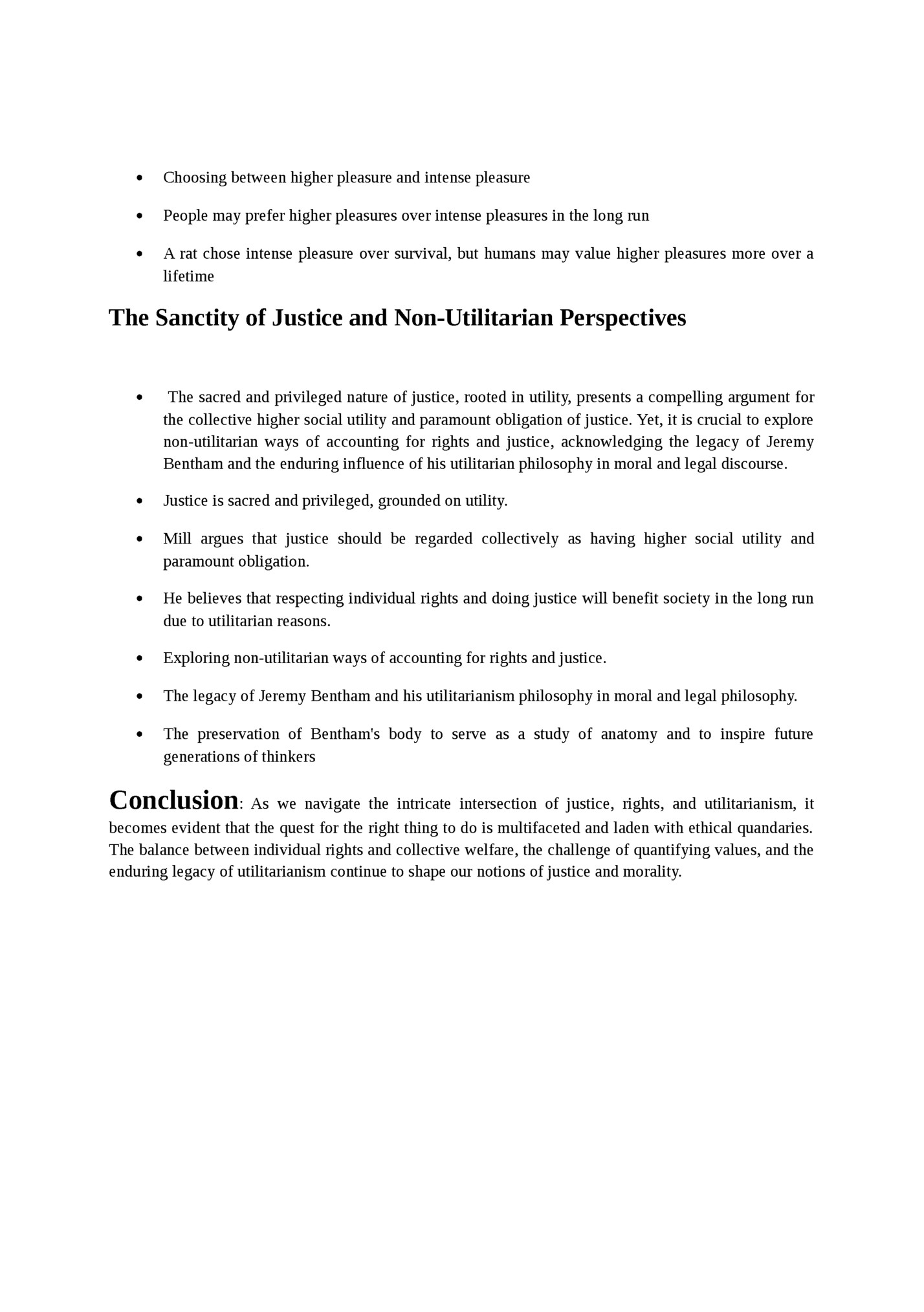
and Lower Pleasures and the Role of Individual Rights Introduction: The urgent issue of just what is just involves the questions of individual rights and the freedom of each person that keep on being debated among society. John Stuart Mill's defense of the idea that quality matters and one's personal freedom is integral to the utilitarianism concept highlights the balancing roles of justice and individual rights. This blog post delves into the core tenets of libertarian philosophy, examining its stance on justice, property rights, and wealth redistribution, as discussed in the video 'Justice: Is it right? or should we all just do whatever feels good to us? Episode 03: THE UNIVERSITY OF HARVARD, with one of the most prestigious institutions in the world, with one of the most legitimate institutions, has created the HUMANE TO CHOOSE film. The Distinction of Higher and Lower Pleasures John Stuart Mill goes further by stating that this type of utilitarianism enables the differentiation between better and worse pleasures. When considering our pleasures, this view takes the notion further: not all pleasures are equal, underscoring that there is a moral dimension within which we need to define and explore through qualitative differences between the things we do for pleasure and the things we forbid us to pursue. An effective real-life example that shows this could be the choice between the temporary and the transient pleasure and the lasting satisfaction comes from the compassion and the empathy acts. The episode revolves around certain facts as followed-: • John Stuart Mill's defense of qualitative distinctions and individual rights in utilitarianism • Mill argues that within utilitarianism, it is possible to distinguish between higher and lower pleasures • He claims that justice and individual rights deserve special respect, as they contribute to society's long-term well-being Individual Rights and Justice Mill extols the significance of justice and individual rights, asserting that these elements play a crucial role in the long-term welfare of society. This perspective prompts us to consider the adverse ramifications of disregarding individual rights in the pursuit of societal benefit. An illustrative example of this concept
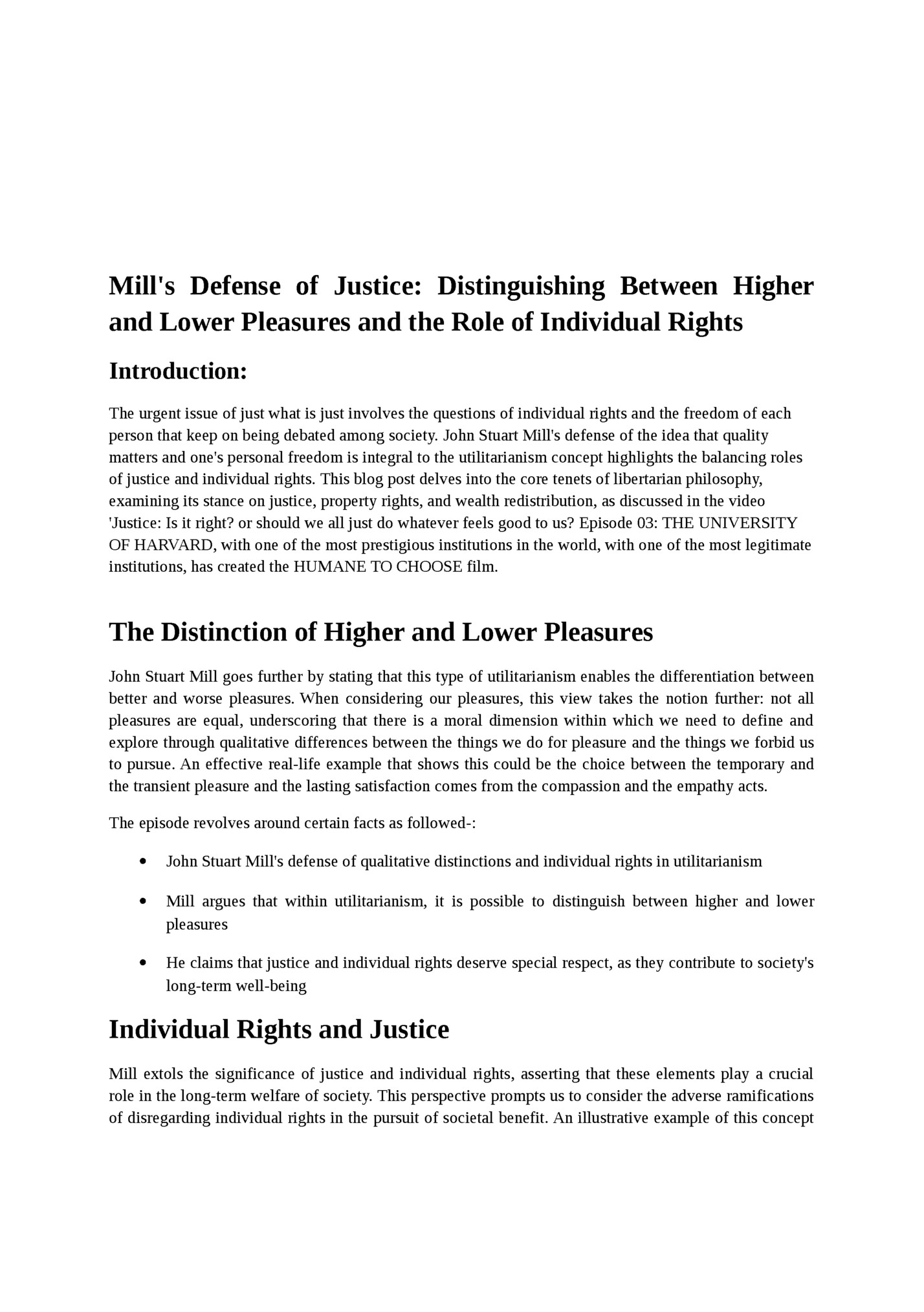
Fleepit Digital © 2021